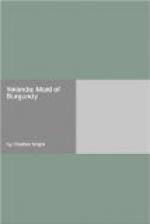“She will absorb that from Your Grace,” I answered.
Her Grace thought that she herself was religious and tried to impress that belief on others; but Max was her god. In truth she was jealous of any woman who looked on him twice, and she kept at the castle only the old and harmless of the dangerous sex. She would have refused Burgundy’s offer quickly enough if her heart had been permitted to reply.
The effect of the letter on Max was tremendous. He realized its political importance, knowing full well that if he could add the rich domain of Burgundy to the Hapsburg prestige, he might easily achieve the imperial throne. But that was his lesser motive. Hymbercourt’s letters to me had extolled Mary’s beauty and gentleness. Every page had sung her praises. These letters I had given to Max, and there had sprung up in his untouched heart a chivalric admiration for the lady of Burgundy. He loved an ideal. I suppose most men and every woman will understand his condition. It was truly an ardent love.
Max kept Hymbercourt’s letters, and would hide himself on the battlements by the hour reading them, dreaming the dreams of youth and worshipping at the feet of his ideal,—fair Mary of Burgundy, his unknown lady-love.
Before the arrival of the messenger from Duke Charles, Max spoke little of the Burgundian princess; but the message gave her a touch of reality, and he began to open his heart to me—his only confidant.
There seemed to have been a reciprocal idealization going on in the far-off land of Burgundy. My letters to Hymbercourt, in which you may be sure Max’s strength and virtues lost nothing, fell into the hands of Madame d’Hymbercourt, and thus came under the eyes of Princess Mary. That fair little lady also built in her heart an altar to an unknown god, if hints in Hymbercourt’s letters were to be trusted. Her maidenly emotions were probably far more passive than Max’s, though I have been told that a woman’s heart will go to great lengths for the sake of an ideal. Many a man, doubtless, would fall short in the estimation of his lady-love were it not for those qualities with which she herself endows him.
Whatever the lady’s sentiments may have been, my faith in Hymbercourt’s hints concerning them were strengthened by Mary’s kindly letter and the diamond ring for Max which came with her father’s message to Styria. They were palpable facts, and young Max built an altar in his holy of holies, and laid them tenderly upon it.
Duke Frederick, with my help, composed a letter in reply to Burgundy’s message. It required many days of work to bring it to a form sufficient in dignity, yet ample in assent. The missive must answer “yes” so emphatically as to leave no room for doubt in Burgundy’s mind, yet it must show no eagerness on the part of Styria. (Duke Frederick always spoke of himself as Styria.) Burgundy must be made to appreciate the honor of this alliance; still, the fact must not be offensively thrust upon him.




